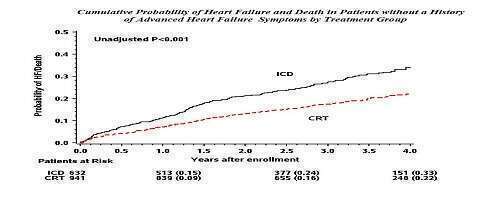Background : MADIT-CRT showed that cardiac resynchronization therapy with a defibrillator (CRT-D) is associated with a significant reduction in the risk of heart failure (HF) or death in patients who had mild HF symptoms (NYHA class I or II) at least 3 months prior to enrollment. In the present study we aimed to evaluate the benefit of treatment of CRT-D in patients without a history of advanced HF symptoms at any time prior to enrollment.
Methods: Interaction-term analysis was used to compare the clinical benefit of CRT-D vs. ICD-only therapy in reducing the risk of HF or death between patients without a history of advanced HF (defined as NYHA class ≥III or past hospitalization for worsening HF) at any time prior to enrollment (Group I)) to those who experienced advanced HF symptoms >3 months prior to enrollment (Group II).
Results: Group I patients (n=1089) comprised 60% of the study population, and experienced a significant and pronounced reduction in the rate of HF or death with CRT-D therapy (Figure). Consistently, multivariate analysis showed that CRT-D therapy was associated with a significant 56% reduction in the risk of HF or death in Group I patients (HR=0.44 [95%CI 0.34-0.57]) compared with a 50% risk reduction in Group II patients (HR=0.50 [95%CI 0.29-0.85]; p-value for treatment-by prior HF group interaction = 0.65).
Conclusion: In MADIT-CRT, treatment with CRT-D was associated with a pronounced clinical benefit among patients with left ventricular dysfunction who never experienced advanced HF symptoms. These findings further support the role of early intervention with cardiac resynchronization therapy in this population.

